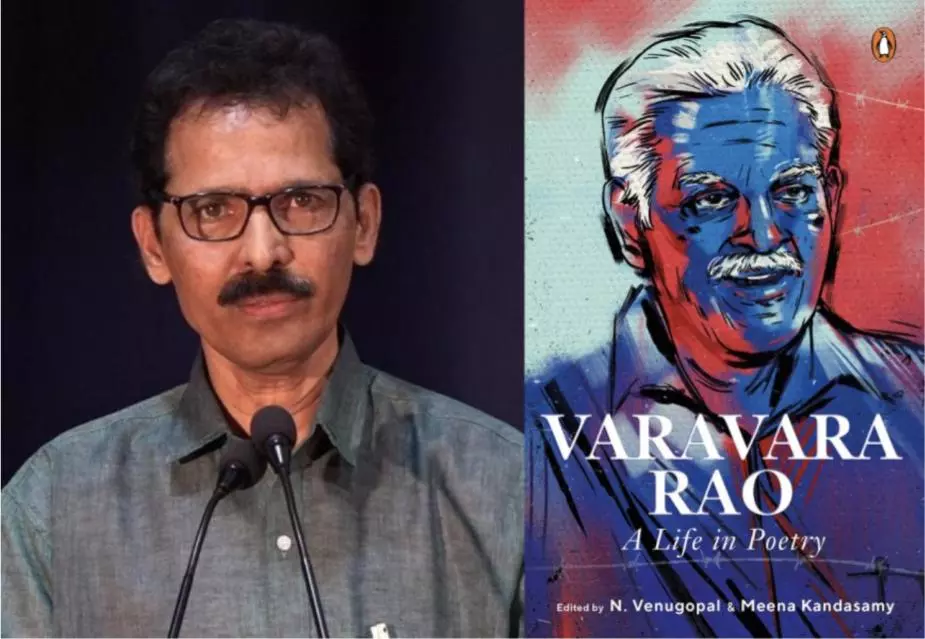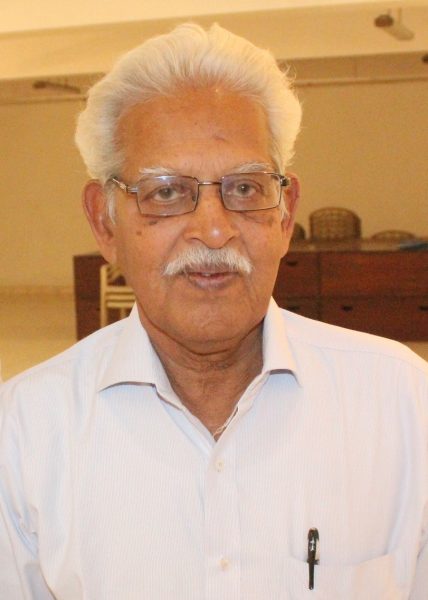
How Varavara Rao shaped Telangana’s sociopolitics: N Venugopal Rao interview

Poet, critic, journalist, public speaker, and translator N. Venugopal Rao has an impressive tally of 32 books in both Telugu and English, and an equal number in translation, to his credit. After having worked as a journalist for two decades, he ventured into publishing Veekshanam, a monthly journal focused on political economy and society.
In 2020, he wrote The Making of Varavara Rao: An Intimate Portrait by A Nephew, when the renowned Telugu poet-activist was languishing in Maharashtra jails as an accused in the infamous Bhima Koregaon violence (Elgar Parishad meeting) case. He has recently co-edited Varavara Rao: A Life in Poetry (Penguin Random House India), along with Meena Kandasamy. The anthology comprises Varvara Rao’s 50 poems, selected and translated from 16 of his published books.
Varavara Rao, besides being a revolutionary figure in Telugu modern poetry, has been an unwavering supporter of social movements from the 1960s to the 2010s. His poetry reflects a tender yet powerful response to social realities. His verses, more than anything else, serve as a symbol of solidarity with the voiceless, the underprivileged, and the oppressed. Despite facing state repression, his poetry remains a powerful tool that transcends traditional forms. Since his release on bail in August last year, Varavara Rao has been actively writing and translating: He has written a biography of Kazi Nazrul Islam, the national poet of Bangladesh, and translated Gulzar’s poetry into Telugu.
In an interview to The Federal, Venugopal Rao shares how Varavara Rao has influenced the socio-political landscape of Telangana through his poetry, the literary magazine he edited, his public speeches, his support to various people’s movements and his association with Naxalbari politics. Excerpts from the interview:
How has Varvara Rao’s influence shaped your life and the lives of those around you? How do you think his multifaceted roles such as creative writer, teacher, editor, organiser, activist inform and influence his work as a poet?
I simply cannot imagine my life without his influence. As he is the youngest brother of my mother, he is part of my family. I have known, seen, heard him and experienced his presence in my life ever since I started understanding the world around me. At the age of 12, coming to Warangal for high school, I started living with him and that continued for ten years till I finished my graduation and moved elsewhere. Thus, my formative years were under his close guidance and influence and that continues till today. His influence on people around me has been tremendous and this circle of influence not only includes his family members, friends and students who have been in direct contact with him, but also thousands of people who do not know him personally, but read his poems, essays and listened to his speeches. Thus, he attracted thousands towards his “magnetic personality,” as described by Dr K Balagopal. His poetry acquired richness with simile, metaphor, anecdote, turn of phrase, and diverse idiom as he approached people in his manifold roles as a creative writer, teacher, editor, organiser and activist and gathered as much of nuances of public life as possible.
Also read: Why axing Agha Shahid Ali’s poems from Kashmir varsities won’t erase his literary legacy
His involvement in literary criticism and translation showcases his engagement with diverse range of literature. How did his exploration of other languages and cultures contribute to his own creative process? Did it influence the themes or styles he employed in his poetry?
Both because of his family atmosphere and later because of his public activity, he has been a voracious reader of a diverse range of literature. Beginning from his early poems he has been using diverse regional, national and international imagery. In fact, his first poem was about a space exploration of the Soviet Union and in his poems of the mid-60s, he referred to the contemporary black and civil rights movements in the US. That reading habit remained intact and in the mid-2020s, when he was hospitalised, he was reading a book a day without any genre limitations.
All this reading resulted in a very creative fusion of diverse, unimaginable, explorative and innovative creative processes. If his poetry, spread over 60 years (which were published in two-volume collections in 2017; now it is 66 years) is analysed carefully, this fusion can be found out. Apart from his education, training and experience, he had got a rare opportunity of jail life — all put together about 10 years, but in at least five different time periods, gave him a lot of time to read. In each of his jail terms he read and wrote a lot and his exposure to world literature is amply shown in his poetry during those times. The reading and reflection naturally led to analytical literary criticism and innovative transcreation.
He has been an influential figure in the socio-political landscape of Telangana, and India. How would you describe his impact on the literary and cultural scene of the region, and what is his significance in the larger context of Indian literature and activism?
His remarkable influence on the socio-political landscape of Telangana has been through five different, yet related channels: his poetry, the literary magazine he edited, his public speeches, his support to various people’s movements and his association with Naxalbari politics. Out of these five, three directly relate to the literary and cultural sphere and thus his impact could be described as more literary and cultural. His poetry influenced hundreds of other poets and thousands of his admirers who came to subscribe to his socio-political understanding. The literary magazine he edited — Srjana, from 1966 to 1992 — influenced scores of poets, short story writers and essayists so much so that it was an honour to be published in the journal. More than two thirds of major poets during those decades and at least till 2010s, actually began their careers with Srjana. Being a teacher of language and literature since 1965, he began his public speaking around 1968 and by 1970, he became one of the most sought-after orators in this part of the country, expressing his opinions not only on literature and culture but also on social, political and economic issues. In the next five decades, he might have addressed around 2,000 gatherings — from small groups of a couple of people to a public meeting of 1.2 million.

By late 1970s, writers and activists from all over India started looking at Telugu revolutionary literature and revolutionary activity in Andhra Pradesh. Varavara Rao was one of those who began visiting places to spread the revolutionary message and build bridges. Thus, in 1983, the first-ever coordinating platform of revolutionary culture and writing, All India League for Revolutionary Culture (AILRC), was formed and Varavara Rao, as an office-bearer of the organisation, met and influenced hundreds of writers and activists from all the states. His poetry has been translated into all Indian languages and appeared in book form in at least half a dozen languages. His role at all India level was so significant that he was invited to be associated with several other pan-Indian literary, cultural and activist organisations and happenings.
His life has been marked by struggles against the state’s repression. In your opinion, what does his story reveal about the power dynamics between artists, intellectuals, and the government? Do you think his experience reflects the broader challenges faced by writers and activists in recent years?
Establishment/status quo is always against any genuine writer and artist since the former opposes freedom of expression and the latter stands for it. As Varavara Rao upheld his freedom of expression and used it to give voice to the voiceless and fight for social justice, the powers that be always wanted to persecute and prosecute him. However, his experience is not his alone, but forms part of similar challenges faced by many other public intellectuals all over the world and equally in India. This intolerance and suppression has grown to ugly levels in the recent years, particularly after Sangh Parivar came to power. To the long list of harassment and incarceration, this state added assassinations also. Varavara Rao also faced death threats and attempts on life several times by police and state-sponsored vigilante groups. With all these challenges and incessant overcoming, his life demonstrates a classic case of conflict between a public intellectual and the state.
In what ways does his poetry transcend the boundaries of traditional forms of expression, such as public speaking, and offer a distinct and multifaceted mode of communication? How does this aspect complicate the translation process?
As a student of language and literature, he was trained in classic traditions, particularly a peculiar Telugu poetic form called padyam, with a distinct prosody, meter, rhyme and rhythm. In fact, he was part of an editorial team that revised and published the authentic version of Telugu translation of Mahabharat. But his social awareness made him transcend the boundaries of tradition and he joined the modern stream in Telugu literature, with a movement of free-verse in late 1950s and early 1960s. During the mid-1960s he is recognized as one of the champions of modern free-verse by launching a literary journal for modern literature and publishing his free verse collection in 1968.
Also read: The Peacemakers review: Stories of courage, hope, and kindness in the face of conflict in India
By the early 1970s, his poetry began to blend modes of public speaking, images from folk traditions and analysis from Marxist perspective. Thus, if we look back, each of his poems has been a perfect amalgam of traditional, classical training, authority on language, felicity of expression, nuances from folk/oral traditions, argumentative style of public speaking and optimist imagery informed by Marxist perspective. These several streams joining to make a single flow would naturally present itself in several layers. However much one tries, it would be near impossible to bring all layers and nuances in translation.
How would you analyse the evolution of his poetry in response to the changing socio-political landscape? In what ways did his writing adapt to reflect the shifting ideologies and aspirations of the times?
His poetry reflects the trajectories of his life as well as his society. Beginning as a naïve progressive poet from a socially-conscious family that took part in anti-colonial struggle (as well against the autocratic Nizam), he initially turned to Nehruvian socialism and within a couple of years transcended it to acquire Marxist perspective. Overcoming the sectarianism of the early Naxalbari phase both in politics and literature, he gradually widened his scope and area of imagination into several areas Naxalbari left out or did not adequately recognize, like gender, caste, communalism, Hindutva, globalisation, environment, onslaught on religious minorities, etc.
Has he been keeping well? What has he been up to since his release on bail last year? Has he been writing anything?
He is known for his elephantine memory and gregariousness. During the two months in mid-2020, he lost his memory and could not even recognise his near and dear. But, fortunately, that phase was short-lived and he regained his immaculate memory once he got bail and started living with and seeing his family and friends. However, he is not allowed to be amidst his people in Hyderabad for the last five years. Despite these difficulties, he has been reading and writing a lot. He began writing his memoirs and translated Gulzar’s poetry into Telugu. On the request of a Telugu publisher, he has written a biography of Nazrul Islam, along with translating more than 50 poems.


